
How to Write a Medical CV Guide with Tips and Examples
If you're seeking guidance on creating an eye-catching medical CV that meets the rigorous standards of the UK healthcare industry - and supports international applications - this guide is for you.
Whether you're a student, graduate, or a seasoned medical professional, crafting a modern CV that highlights your unique skills and adheres to industry-specific requirements is essential.
In this comprehensive guide, we help you create a professional medical CV format that resonates with employers for various healthcare roles, from a medical secretary and midwife to a consultant.
In the article we cover:
What makes a great medical CV in the UK.
Ready-to-use medical CV templates for different levels.
The most sought-after skills for a medical CV.
The perfect CV length for a medical professional.
How to write a CV for medical students.
How to showcase your clinical experience.
If you're applying for a job as an international student, this guide provides tips on writing a CV to meet global standards, enhancing your chances of success in the UK.

Need help getting started in your job search? Creating a CV is easy with CVMaker's user-friendly tools and a professional CV template.
Medical CV example UK
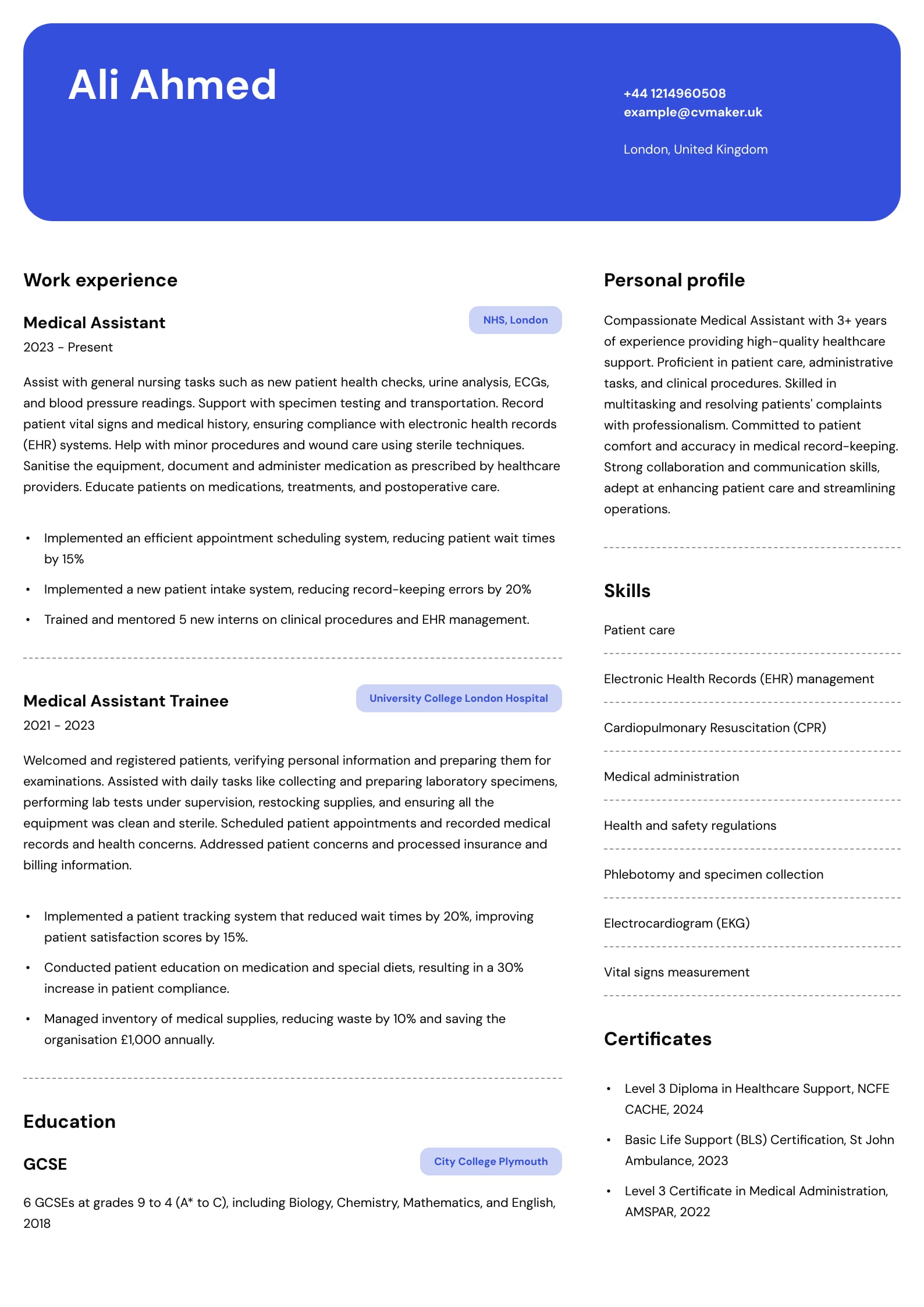
Download this CV example - Medical CV PDF
This sample medical CV showcases Ali, a Medical Assistant, as a qualified and experienced healthcare professional. The Erasmus template effectively displays his work history on the left, while highlighting his skills, education and memberships on the right. Light font for his profile and eye-catching labels for employers enhance readability and make key details stand out.

Need a cover letter? Check out our matching medical cover letter example to help you streamline your application, boosting your chances of getting noticed in the job market.
What to include in a medical CV?
Whether you're applying for a job as a nurse, pharmacist, support worker or in various administrative or laboratory technician roles, there are certain sections hiring managers will expect to see. Including these sections also increases your chances of getting through the applicant tracking systems (ATS) used in the medical field to filter applications based on specific criteria:
Personal details: This is where you can add your contacts details such as full name and number. Including any post-nominal letters such as PhD or MSc is advisable.
Personal profile: Highlight your professional role, motivations, key competencies and approach to patient care or healthcare services.
Skills: List your most relevant hard and technical skills, such as clinical procedures, lab techniques, patient communication or administrative software.
Work experience: Concisely outline your relevant work experience in the healthcare system, incorporating soft skills like teamwork, adaptability and patient-centred care. Include dates to quantify your experience.
Education: Provide a brief list of your educational background, including any medical qualifications or healthcare certifications.
Relevant associations and memberships: Mention any professional associations or memberships that enhance your qualifications such as National training number or General Medical Council registration.
References: Many medical roles require you to include references, so ensure you have them prepared and available upon request.
Must-have CV sections
Personal profile
Skills section
Work experience
Education
Learn more about how to write a good CV.
Create a master CV
When it comes to writing a medical CV, creating a master CV saves time and gives you a comprehensive overview of your skills and achievements. Use it as a base for building job-specific CVs that are clear, concise and tailored for each application.
A well-organised master CV helps ensure consistency across your applications and can even give you the confidence to begin salary negotiations or promotion requests.
By customising your CV to each role, you highlight your strengths, underscore accomplishments and shine a spotlight on your unique working style within the medical profession.
Even when applying for roles outside direct healthcare, such as a biomedical scientist or optometrist, your CV should reflect a clear commitment to excellence in your chosen field. Deftly including certificates or further training is a good way to do this.
Pro Tip
Customise your master CV for each application to reflect the job requirements and demonstrate your alignment with the healthcare organisation you are applying to.
How to write a CV for a medical job in 5 steps
1. How to write a personal profile on a medical CV
In the medical field, a well-crafted personal profile on a CV sets the tone for your job application, highlighting your suitability for the role and offering a concise snapshot of your professional background, key soft skills and career goals.
In a sector where character, empathy and personal dedication are as vital as technical expertise, it’s important to concisely convey your experience, motivations plus showcasing core soft skills you feel define your working style. Such as professionalism and commitment to patient care and teamwork.
Personal profile on a CV
Whether you are a student, a graduate, or a seasoned professional, a personal profile is essential for your CV when targeting the UK job market. This statement should grab the attention of employers and set you apart from other applicants.
Learn more about how to successfully pitch yourself in a personal profile.
Medical student CV personal profile example
Driven medical student passionate about patient care and clinical excellence. Committed to building a strong foundation through rigorous academic training and diverse clinical rotations. Demonstrates exceptional teamwork and communication skills, essential for collaborating with healthcare professionals. Motivated to contribute to patient outcomes while pursuing continuous learning and professional growth.
Medical internship CV personal profile example
Enthusiastic medical intern dedicated to patient-centred care. Equipped with a solid theoretical foundation and practical experience from diverse clinical placements. Known for adaptability and thriving under pressure in fast-paced environments. Committed to honing clinical skills and making meaningful contributions to healthcare teams while embracing opportunities for professional development.
Learn more about how to write a CV for a medical internship.
Medical receptionist CV personal profile example
Organised medical receptionist focused on enhancing patient experiences. Over 3 years of experience managing front desk operations in busy healthcare settings. Skilled in patient communication, appointment scheduling, and maintaining confidential records. Known for a warm demeanour and commitment to smooth clinic operations. Motivated to support patient care through exceptional administrative support.
Discover more about how to write a medical receptionist CV.
Medical consultant CV personal profile example
Dedicated medical consultant providing exceptional patient care and strategic leadership with 10+ years of experience. Demonstrates expertise in diagnosis, treatment, and management of complex conditions. Builds strong relationships with patients, families, and staff. Passionate about medical education, quality improvement, and mentorship; contributing to the professional development of junior colleagues.
Medical resident CV personal profile example
Committed medical resident with 3 years of experince focused on high-quality patient care. Comprehensive clinical training with hands-on experience in diverse settings. Strong diagnostic and problem-solving skills, coupled with deep empathy and patient advocacy. Dedicated to advancing medical knowledge and refining expertise while contributing to positive patient outcomes and preparing for a long-term medical career.
Pro Tip
Your personal profile should always fit the specific role and highlight your unique attributes and career aspirations. It should be concise, engaging, and demonstrate your fit for the position.
2. What skills should I put on a medical CV?
A CV format for medical professionals should put as much focus on skills as it does on professional experience. Identifying which skills to put on a CV is crucial to demonstrating your qualifications and readiness for medical roles. Employers seek a combination of clinical expertise, technical proficiency and strong interpersonal abilities to ensure exceptional patient care and efficient operations.
Highlighting diverse skills illustrates your comprehensive capabilities whilst aligning your profile with the specific job requirements. Whether applying for positions such as a physiotherapist, plastic surgeon, chemist or psychologist, it's important to emphasise hard and soft skills that reflect your professional competence and personal dedication. Although sometimes considered a soft skill, foreign languages are certainly a sought-after hard skill in the healthcare industry.

5 essential medical skills for a CV
Regardless of the role you are applying for, the following five skills are essential in the healthcare industry.
Clinical expertise: Proficient in diagnosing and treating various medical conditions.
Patient communication: Ability to convey medical information clearly and compassionately.
Team collaboration: Skilled in working with multidisciplinary teams for optimal patient outcomes.
Attention to detail: Meticulous in maintaining accurate medical records, log book and treatment administration.
Empathy: Demonstrates genuine concern and understanding for patients' needs and well-being.
Soft skills on a medical CV
Healthcare professionals, such as paramedics, who can mix an extensive range of technical knowledge with an ability to empathise and communicate are highly sought-after individuals. Learn more about how to incorporate soft skills into your CV.
Hard skills on a medical CV
These are otherwise known as ‘learned skills’ and are often the techniques, practices and abilities developed through professional training, practical experience or formal education. IT skills are becoming increasingly vital in the medical profession as technology transforms healthcare roles from opticians to GPs. From managing electronic health records to using telemedicine platforms and data analysis tools, tech proficiency is now essential for improving patient care and streamlining medical processes.
Technical skills on medical CV
These are hard skills pushed into a more specialist direction. A CV for a medical lab technician will have very different technical skills from a junior doctor CV. Being able to use Microsoft Word is a hard skill; performing diagnostic tests on bodily fluids is a technical skill.
Take a look at the following for some clinical skills examples you could add to your CV:
| Soft skills | Hard skills | Technical skills |
|---|---|---|
| Communication | Clinical diagnosis | Proficiency in medical software (e.g., Epic, Cerner) |
| Compassion and empathy | Medical procedures | Use of diagnostic equipment (e.g., MRI machines, ECGs) |
| Teamwork and collaboration | Electronic health records (EHR) management | Surgical instruments handling |
| Critical thinking | Pharmacology | Laboratory instrumentation |
| Stress management | Patient assessment | Medical imaging software |
Medical jobs offer flexible opportunities, making them ideal student jobs and those seeking part-time work, while gaining valuable work experience in a rewarding field.

3. How to write work experience on a medical CV
The best way to organise your work experience on a CV is in reverse chronological order. Start with your most recent position and job title, including the hospital, clinic or laboratory, along with employment dates and location.
To make a strong impact or if this is your first job CV, separate your responsibilities from key achievements, utilise action verbs and tailor experiences to the job you’re applying for. This approach provides employers with a clear view of your relevant experience and shows your dedication to meeting their specific needs.
What should each work experience entry include?
Job title of current or previous role
Organisation name and location
Dates of employment (month/year)
A concise paragraph detailing your duties
Followed by 2–3 bullet points that highlight your key achievements or measurable impact.
Learn more about the work experience section in a CV.
Coming back to work after time away? Check out our careers blog for specific advice on re-entering the workforce after a career break or explaining unemployment on your CV.
Examples of work experience for a medical CV:
Medical Laboratory Assistant | Osbourne Clinic, Birmingham, UK | 2020 - present
Provide valuable support to the Pathology team of Scientists, ensuring the smooth and efficient functioning of laboratory operations. Administer specimens, manage inquiries and prioritise a demanding workload. Prepare reagents, solutions and specimens following standard protocols maintaining strict adherence to safety guidelines. Work under pressure to maintain accuracy and strict protocols.
Manage the processing and analysis of a high volume of blood samples, averaging 85 samples per week, ensuring accurate and timely results.
Developed and implemented streamlined lab processes, reducing documentation time by 2 hours per day and enhancing efficiency and productivity.
Medical Resident | St. Thomas' Hospital, London, UK | 2021 - 2023
Delivered comprehensive care to a diverse patient population in a high-acuity environment and managed the diagnosis, treatment and ongoing care of patients under the supervision of senior consultants. Conducted patient assessments, ordered and interpreted diagnostic tests and developed treatment plans. Prioritised patient safety and care quality while maintaining accurate and detailed medical records.
Managed the care of an average of 20 inpatients daily, ensuring timely and appropriate treatment in line with hospital protocols.
Developed and executed treatment plans for acute and chronic conditions, leading to a 15% reduction in readmission rates.
Example of a medical student CV with little or no work experience:
If you have little or no work experience, for example, if you are a school leaver, are completing a medical apprenticeship, medical degree or foundation training, try to position your experience toward the soft and hard skills you gained during your placements or various extra-curricular training.
In addition, volunteer experience can provide an extra dimension to your work history and highlight your commitment to helping others and patient-orientated care.
Volunteer | St. Cecilia’s Hospice, Birmingham, UK | 2016 - 2017
Acquired and developed valuable skills relevant to the medical profession. Engaged with individuals in need of social care and fostered empathy, compassion, and effective communication. Performed various administrative tasks relating to resident records and medication distribution. Collaborated within a diverse team emphasising adaptability, cultural sensitivity and teamwork in delivering holistic care.
Provided comfort and support to over 30 hospice residents during a combined 100 hours of volunteering.
Worked together with hospice staff and residents' families to develop a constructive space for hospice feedback.
Pro Tip
Use a paragraph to describe your daily responsibilities, followed by two bullet points highlighting quantifiable achievements.
4. How to list education on a medical CV
Highlighting education on a CV is crucial for demonstrating your qualifications and skills. Follow these tips to effectively list your education, whether its formal or informal:
Start with your highest level of education and list qualifications in reverse chronological order, including the institution's name, qualification and completion date.
Use consistent formatting for all entries to maintain a professional look.
Include relevant focus areas if applicable to highlight specific expertise (e.g., Pediatrics or Oncology).
Mention distinctions to showcase academic achievements.
List relevant coursework, research or clinical rotations if experience is limited.
Check out the following article if you are writing an academic medical CV.

How to format a university degree
[Degree] in [program name], [institution/school name], [Location], [date range, year of graduation, or in progress]
Bachelor of Medicine, Bachelor of Surgery (MBBS), Birmingham Medical School, 2014-2019
How to format an apprenticeship
[Course name], [institution/school name], [Location], [date range, year of completion, or in progress]
Medical Laboratory Science Apprentice, Queen Elizabeth Hospital, Birmingham, 2019-2020
How to format UK GCSEs
[School Name], [School Location], [Years Attended]
[n] GCSEs (including Mathematics and English)
Liston Academy, London, UK, 2016
10 GCSEs in grades A–C, including Mathematics and English
How to format A Levels
[A Level] in [Subject 1], [Subject 2], [Subject 3]
[School Name], [School Location], [Years Attended]
Maths (A) Biology (A) Chemistry (B)
Hills Wells College, London, UK, 2018.
If you are about to graduate or have recently left university, check out our article packed with career advice for entering the workforce after graduation.
5. Enhance your medical CV with additional sections
You might consider including the following sections on your CV to further showcase your experience and eligibility for your desired job:
How to list publications on a medical CV
Publications can add further insight into your knowledge and areas of expertise. When listing publications on a CV, include the title, authors, journal name, publication date and any relevant details.
[Author(s)].[Title]. [Journal]. Year]. [Pages]. [PubMed Identifier (PMID) number:]
Byrd J, Field H, Bell D. The impact of sugar consumption on adolescent adults. British Medical Journal. 2019. 341-356. PMID: 12345668990
How to include courses and certifications on a medical CV
Courses and certificates in a CV demonstrate how you are committed to your professional development as well as your expertise in a certain area. Whether you participated in an online course or during your studies, you can add it in this section.
[Title], [Organisation/Issuer], [Date]
ILS (Immediate Life Support) Course, Resuscitation Council UK, 2021
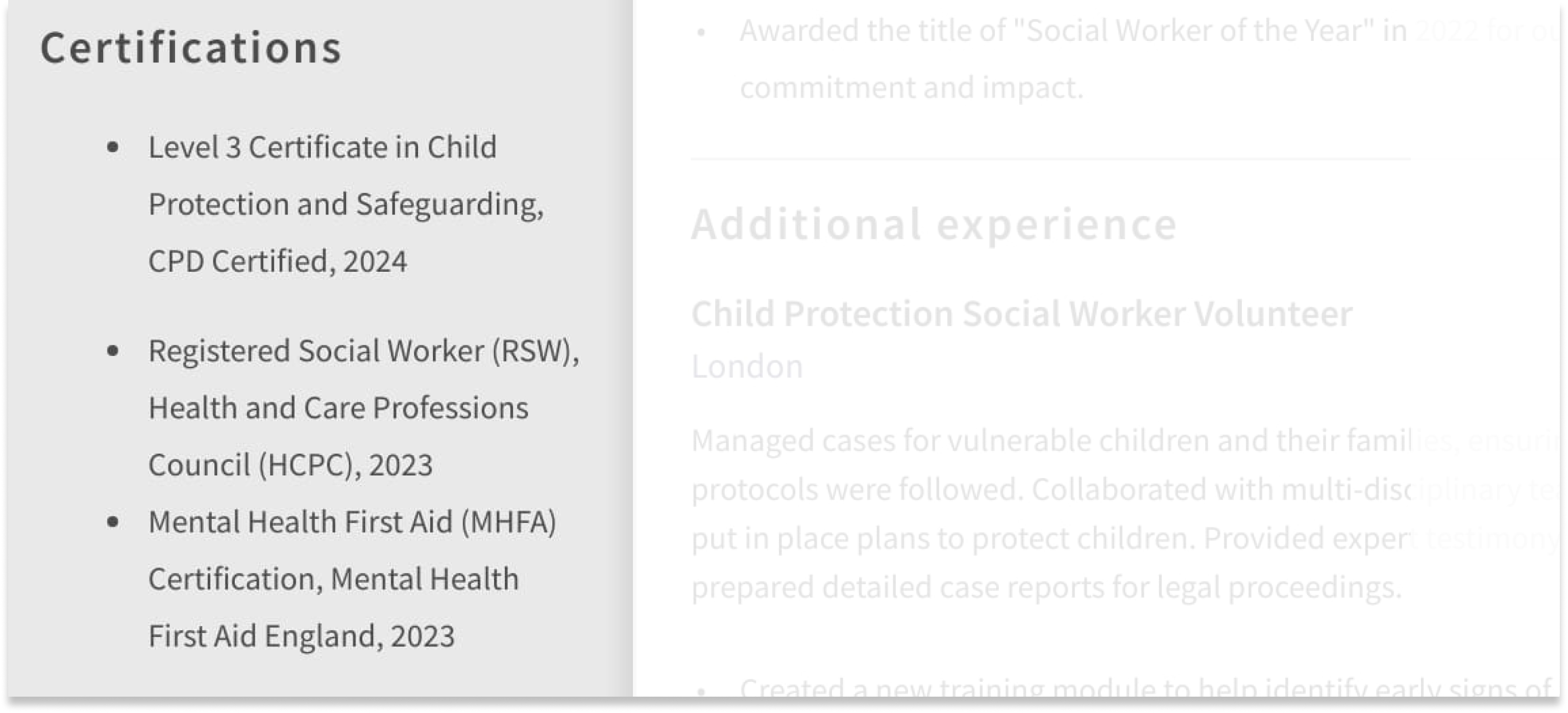
How to include teaching experience on a medical CV
Teaching experience can play an important role in the life of a medical professional. Include any teaching experience you have, whether it be formal or informal. There is no specific way to list this on your CV, but mention the topic you taught, who your audience was and your successes from this experience.
Informal teaching sessions for medical students, Kingston Hospital, Ongoing
Clinical Skills Teacher, University of Bristol Medical School, 2019-2023
For more information about adding teaching experience to your medical CV, see our teacher CV example.
How to improve your CV as a medical student
Improving your CV as a medical student can be tough as you try to differentiate yourself from the pack. However, there are some easy fixes you can consider:
Make your education more prominent
Draw attention to clinical placements, research projects and relevant volunteer work.
Showcase your skills in a dedicated section
Build your work experience around the soft skills mentioned in the job advert
Include leadership roles (even volunteer), presentations or publications.
Additionally, seeking mentorship and professional guidance is a great way to ensure your CV effectively represents your potential as a future medical professional.
Key takeaways
When crafting a professional medical CV, it can be easy to lose the overview. Here are the five key takeaways you should keep in mind:
Tailor your CV to the role: Customise your CV for each application, highlighting relevant skills, experiences and accomplishments that align with the job description.
Highlight work experience effectively: Structure your work experience in reverse chronological order, clearly detailing responsibilities, achievements, and quantifiable results to demonstrate your practical impact.
Use action verbs: Write with strong, action-orientated language to showcase your contributions and the value you bring to a medical team.
Focus on relevant skills: Emphasise a balanced mix of hard, soft and technical skills, critical for success in your specific medical role.
Be clear and concise: Ensure your CV is well-organised, easy to read and free from unnecessary details.
Next steps?
Give your CV the introduction it deserves. Explore our cover letter templates and get step-by-step guidance on how to write a winning cover letter, especially if you’re sending your CV via email. Leave nothing to chance and connect with our professional CV Writing Service for an expert seal of approval. Then check out our top tips for tracking your job applications.
Once you have a stand-out cover letter and CV prepared, get ready for potential interviews by researching our examples of NHS interview questions.
FAQs
What are the different types of medical jobs in the UK?
In the UK, there are various jobs, including doctors, nurses, pharmacists, biomedical scientists, laboratory technicians, radiographers, consultants, interns and more. These roles span different specialities and levels within the healthcare industry. Learn more about what opportunities there are as a school leaver.
How to improve the readability of a medical CV?
Begin each bullet point with a strong action verb to convey a proactive approach. Keep bullet points concise and focused, using clear and specific language. Use bullet points to enhance readability.
What is the best format for a medical CV?
The best format for a medical CV is generally reverse chronological, starting with your most recent experience. Include sections such as personal details, education, work experience, skills, certifications, publications and references. Use clear headings, bullet points and a professional font. Tailor the content to the job requirements and ensure readability.
How to write a CV for medical work experience?
Highlight relevant work experience in reverse chronological order, emphasising specific responsibilities, achievements, and skills gained. Tailor the content to match the job description, using active language. Include clinical placements, internships, or volunteer work, and quantify achievements where possible to demonstrate impact.
Which medical jobs are in high demand in the UK?
High-demand medical jobs in the UK include nurses, general practitioners (GPs), paramedics, radiographers, and biomedical scientists. Mental health professionals, such as psychologists and counsellors, are also in high demand due to the increasing focus on mental health services. Learn more about how this industry is one of the biggest in the UK.
Which medical profession is the highest paid in the UK?
Consultant doctors are generally the highest-paid medical professionals in the UK, especially those specialising in fields like cardiology, neurology, and orthopaedic surgery. Salaries can significantly exceed £100,000 annually, depending on experience, location, and speciality. Check out our related blog article on the highest-paying jobs in the UK for more information on career prospects and average salary for medical roles.
How do I get an NHS job in the UK without experience?
You can get an NHS job without experience by applying for entry-level roles like healthcare assistant, porter, or admin support. Check the NHS Jobs website for roles that offer training. Volunteering at an NHS facility is also a great way to gain experience and build connections.
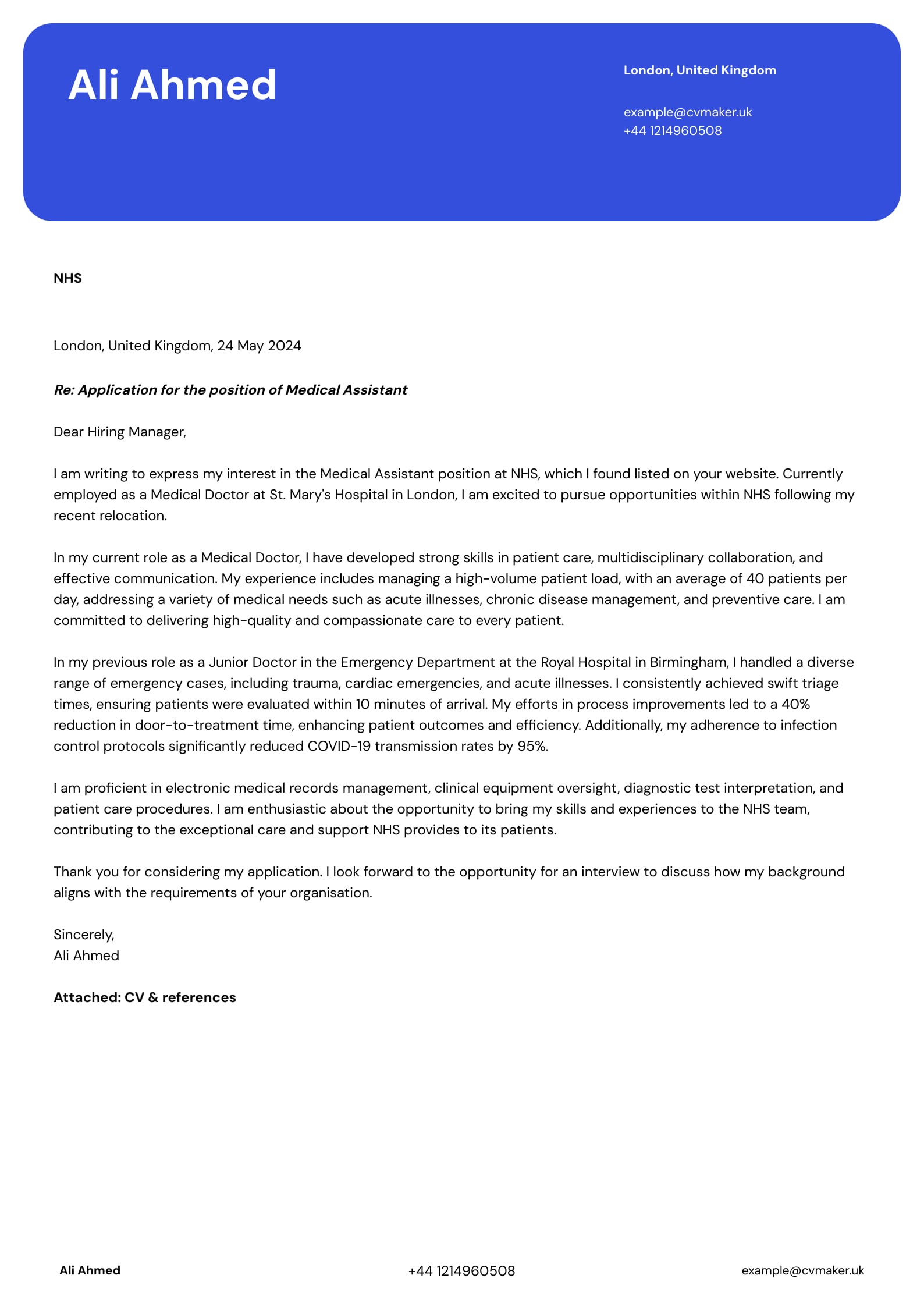

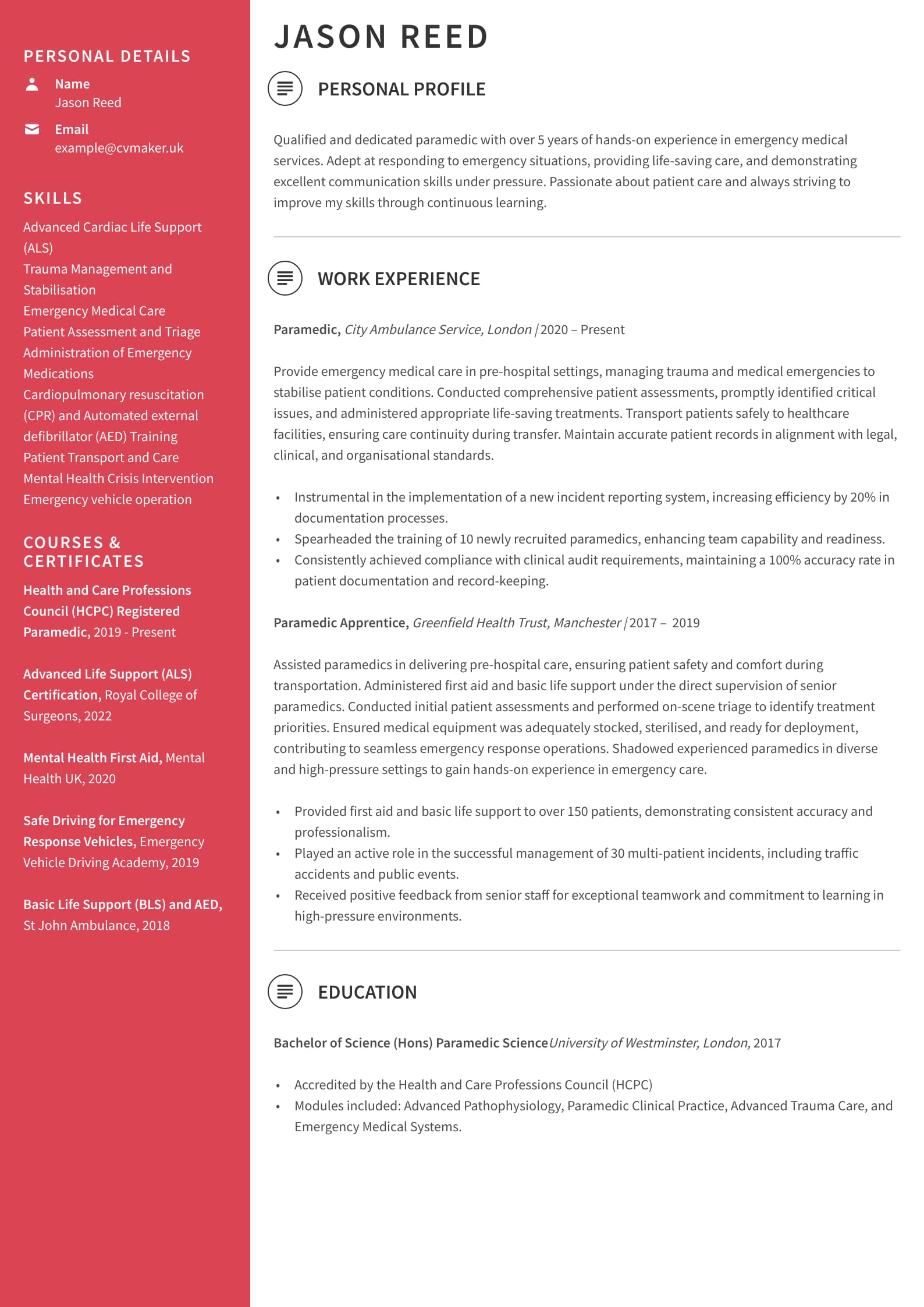
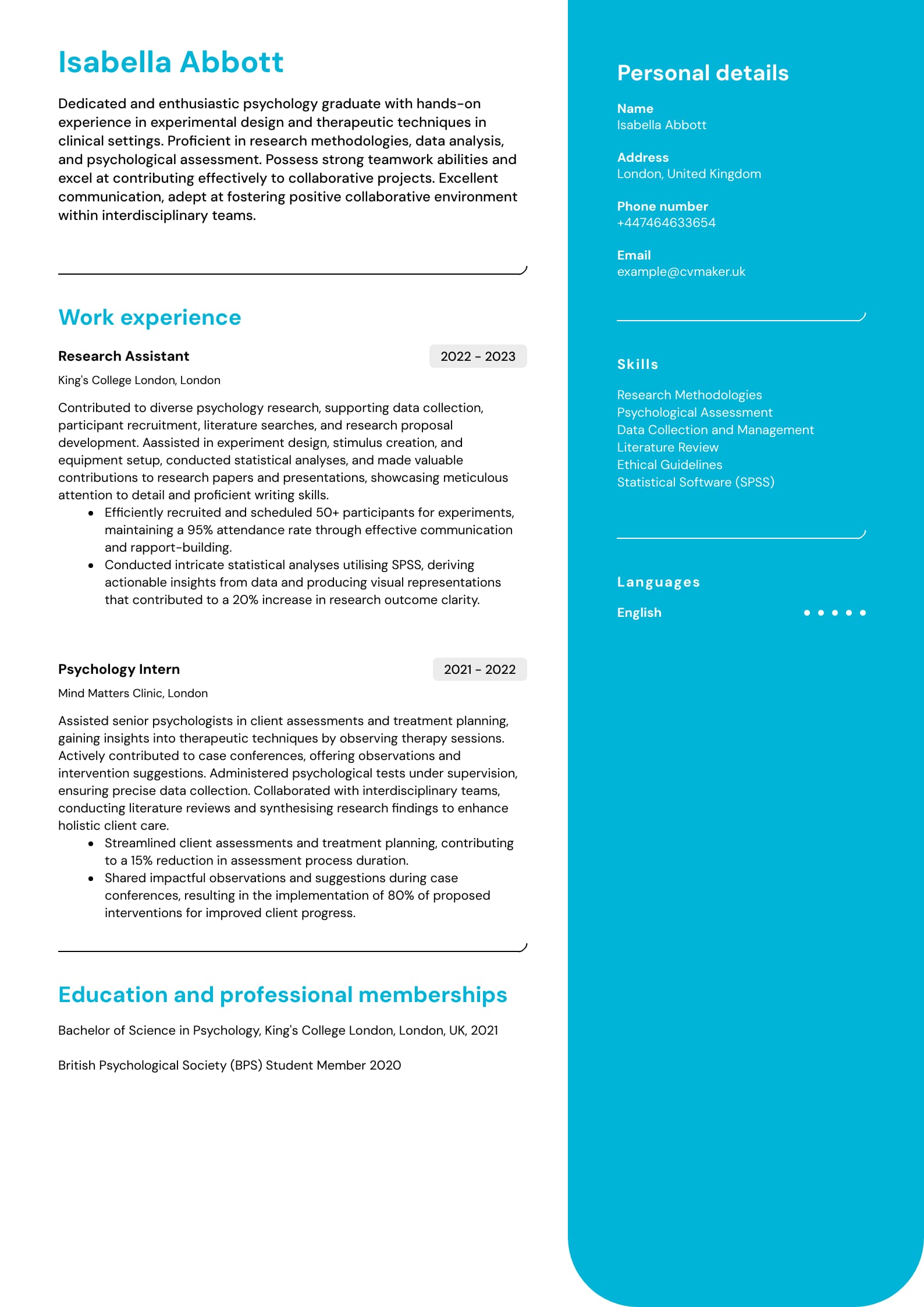


)

)
